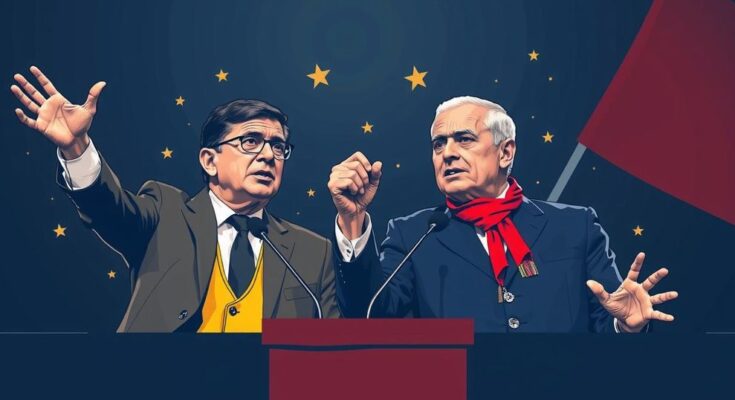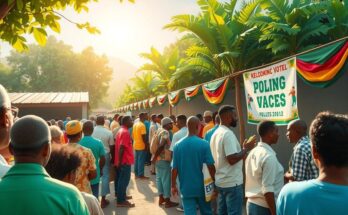Romania’s presidential election on November 24, 2024, features candidates from the left and the far-right. Marcel Ciolacu (PSD), George Simion (AUR), Elena Lasconi (USR), and Mircea Geoana (Independent) represent varied political ideologies. Key issues include national security, economic growth, and Romania’s place within the EU and NATO. The election may lead to a runoff on December 8, 2024, reflecting voters’ concerns over stability and governance.
Romania is poised to conduct a presidential election on November 24, 2024, with a diverse array of candidates anticipated to narrow the contest toward nationalistic and leftist representations. Prime Minister Marcel Ciolacu, the candidate from the Social Democratic Party (PSD), positions himself against several contenders, including George Simion from the Alliance for the Unity of Romanians (AUR), Elena Lasconi from the Save Romania Union (USR), and Mircea Geoana, an independent candidate and former NATO Deputy Secretary General. Each candidate proposes unique political strategies, presenting a significant decision-making moment for Romania in national security and foreign affairs, culminating in a potential runoff election on December 8, 2024.
At 38, George Simion has been a significant and polarizing figure within the political landscape, representing the far-right AUR, which embraces nationalist ideologies. Despite facing bans from Moldova and Ukraine due to security concerns, he asserted his commitment to representing Romanian interests, emphasizing traditional values of family, nation, faith, and freedom. He has been embroiled in controversies regarding affiliations with extremist movements, particularly following accusations linked to his party’s stances against various international policies and social issues.
Ciolacu’s campaign revolves around economic growth and Romania’s esteemed position within the European Union (EU) and NATO. He has criticized extremist ideologies while advocating for a Romania that prioritizes investments and internal development to ensure no citizen is left behind. Notably, Ciolacu aims to foster a respected Romania that aligns with the EU and addresses political isolationism.
Among other candidates, Lasconi pledges to combat systemic corruption, a pervasive issue observed since Romania’s accession to the EU in 2007, asserting that it has hindered the nation’s credibility within Europe. She advocates increased defense spending and robust support for Ukraine as a part of her campaign strategy. Meanwhile, Geoana highlights his international experience, positing that Romania must emerge as a multi-regional power, capable of advocating for its citizens and navigating complex geopolitical challenges.
As the election approaches, various candidates face the challenge of mobilizing voter support amidst a backdrop of skepticism towards established political norms. Notably, public sentiment appears to align towards fearing potential instability should extremist candidates like Simion succeed in garnering significant electoral support. The forthcoming elections will not only shape Romania’s immediate political milieu but will also resonate across Europe, reflecting broader trends in populism and nationalistic governance.
The upcoming Romanian presidential election set for November 24, 2024, is a pivotal moment in the country’s electoral landscape, characterized by a range of ambitious candidates from various political backgrounds. This election follows a notable period of political turbulence marked by rising nationalistic movements and a growing disillusionment with traditional political entities. As Romania continues to navigate its European Union (EU) membership and NATO commitments, the stakes are high for candidates with different visions for the nation’s future, influencing both internal governance and international relations. The election is expected to significantly impact Romania’s stability and identity within the broader European context, particularly against the backdrop of recent geopolitical tensions in Eastern Europe.
In summary, Romania’s presidential election is a critical juncture for the nation, showcasing a varied slate of candidates symbolizing differing ideologies. The forthright perspectives presented by Ciolacu, Simion, Lasconi, and Geoana will determine the political climate as Romania attempts to navigate complexities within the EU and NATO frameworks. The potential outcomes could reshape not only domestic policy but Romania’s role on the international stage, as voters grapple with the implications of their choices, weighing between extremism and established governance.
Original Source: apnews.com




